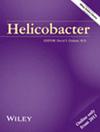As the antibiotic resistance and treatment failure rates of Helicobacter pylori are rising, the need for rescue therapy with rifabutin for H. pylori eradication (HPE) is also increasing. Therefore, in this study, we investigated the efficacy, resistance status, and adverse events in patients receiving rifabutin-based HPE.
Between January 2020 and December 2022, 3006 patients underwent esophagogastroduodenoscopy (EGD) with H. pylori culture tests. Of these, culture results were successfully obtained from 1792 patients, who were subsequently enrolled in our study. The medical records of these patients were retrospectively reviewed, and their clinical features and outcomes assessed.
Among the 1792 patients, 14 (0.8%) were rifabutin-resistant. A total of 665 (37.1%) patients had multidrug-resistant (MDR) H. pylori infections. Patients with rifabutin-resistant H. pylori infections had a significantly higher rate of tuberculosis treatment history (2.8% vs. 28.6%, p < 0.001) and MDR H. pylori infections (49.6% vs. 85.7%, p < 0.001) than those in the rifabutin-susceptible H. pylori group. Among the 45 patients who received the rifabutin-based HPE regimen, 44 (97.8%) had MDR H. pylori infection, and 35 (77.8%) underwent rifabutin-based HPE as a third-line treatment or beyond. A total of 31 (68.9%) showed successful eradication. Nineteen (42.2%) patients experienced at least one symptom of adverse events; however, the severity of side effects was mild, and no patient discontinued treatment because of this.
The rifabutin-based HPE regimen could be an effective and safe treatment method. It is particularly considered a viable therapeutic option for patients who require HPE but have previously failed to respond to multiple HPEs.


